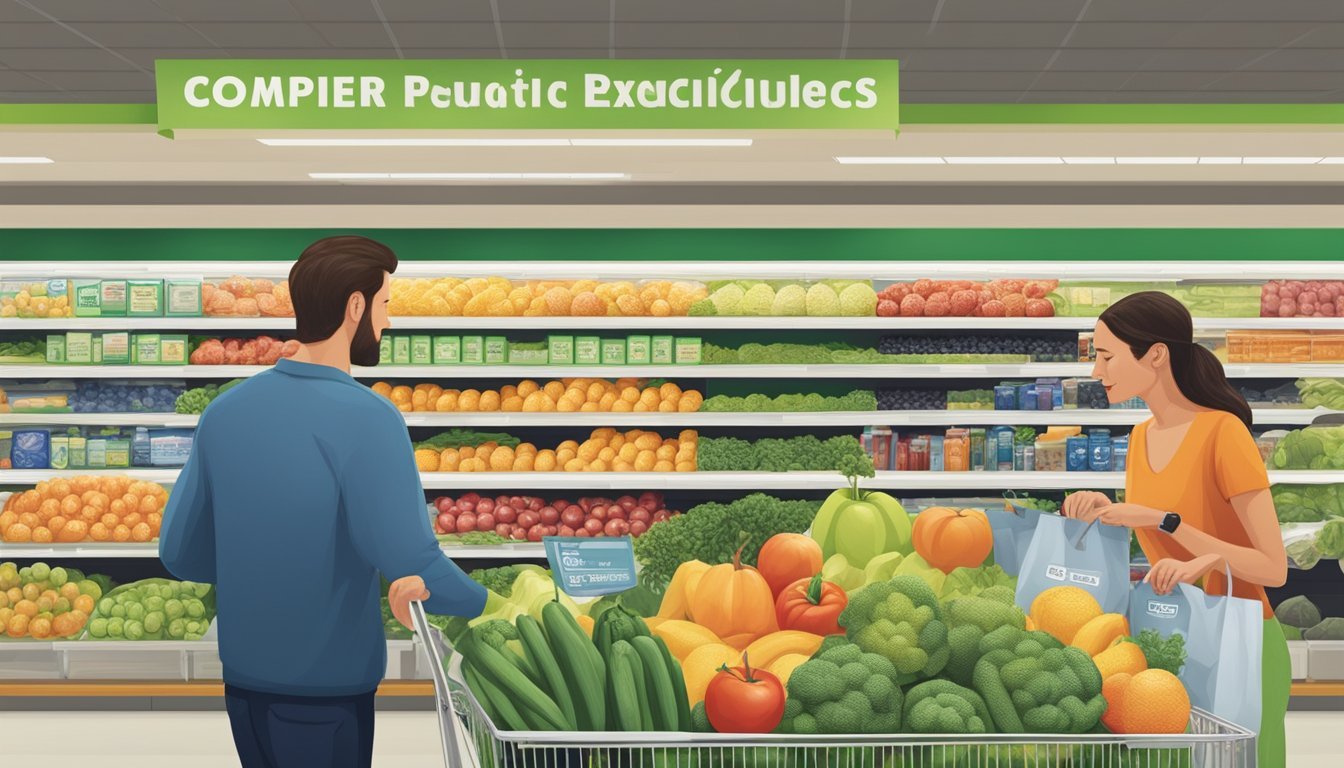Costco vs Publix Showdown
Comparing Shopping Experiences and Value
Part of Our Grocery Store Guide with Details on Costco and Publix Showdown
Choosing the right grocery store can greatly influence one's shopping experience, budget, and overall satisfaction with the products purchased. Costco and Publix are two prominent grocery chains that have secured strong loyalties among shoppers. While both stores provide a unique set of offerings and services, they cater to different consumer needs and preferences, making the choice between them an important one.
Costco is known for its membership-based wholesale model, offering a wide range of products in bulk quantities at competitive prices. The store’s value proposition focuses on savings and benefits for customers with large shopping needs, often making it the go-to for household items and groceries in large quantities. Publix, on the other hand, emphasizes a friendly shopping environment, robust selection of ready-to-eat meals, and high-quality produce. Unlike Costco, Publix does not require a membership, allowing customers to shop without an upfront fee.
When deliberating between Costco and Publix, shoppers weigh factors such as the variety and quality of offered items, pricing, store layout, customer service, shopping convenience, and brand reputation. These aspects greatly influence the overall shopping experience and consumer satisfaction, which is echoed in customer satisfaction scores and brand comparisons. The decision ultimately depends on individual needs, shopping habits, and personal values regarding grocery purchases.
Company Profiles
The following section provides a concise overview of Costco and Publix, two major players in the U.S. supermarket industry. They have established themselves as reliable grocery store chains with distinct histories and significant footprints across the nation.
History of Costco
Costco, the renowned warehouse club, was founded in 1983 in Seattle, Washington by James Sinegal and Jeffrey Brotman. Its business model is based on offering bulk items at discounted prices for members. The first warehouse established under the Costco name paved the way for what would become one of the largest retailers in the world in terms of revenue. Costco stands out for its commitment to ethical business practices and its company policy of not opening on certain holidays, reflecting its corporate values.
History of Publix
Publix Super Markets, Inc., commonly known as Publix, is a supermarket chain headquartered in Lakeland, Florida. It was established in 1930 by George W. Jenkins and has since grown to be one of the largest regional grocery chains in the United States. Publix has built its reputation on a customer-centric approach, focusing on customer service, cleanliness, and product availability. The company has been recognized for its dedication to its employees and its operation as one of the largest employee-owned companies in the U.S.
Business Models and Strategies
In the battle of grocery titans, Costco and Publix employ markedly different approaches to market dominance. This section breaks down the core strategies of each.
Costco's Wholesale Model
Costco operates a membership-based wholesale model, thriving on bulk sales and limited stock keeping units (SKUs) to offer competitive pricing. They strategize to transform a shopping trip into a treasure hunt experience where customers discover an eclectic mix of brand names and private labels. Costco's low-profit margin strategy is paired with high-quality items, making value central to their marketing. Moreover, Costco's substantial revenue, reportedly over $4 billion in 2022, testifies to the success of their wholesale approach.
Publix's Retail Strategy
Publix stands as a prominent player in the retail grocery sector, focusing on customer experience, employee ownership, and community presence. They emphasize high-quality products and exceptional customer service, steering clear of wholesale practices. Unlike Costco, Publix does not require a membership, instead marketing their value proposition through frequent deals and promotions. The brand maintains a strong local brand attachment, setting a contrast against Costco's global reach. Publix's strategy revolves around creating a loyal customer base that appreciates both their product quality and community-engaged brand.
Product Selection and Quality
When comparing Costco and Publix, customers will find varying strengths in product selection and quality. Costco is known for its expansive selection across various categories, whereas Publix places a high emphasis on quality, particularly with its produce and meat offerings.
Costco's Product Range
Costco offers a wide variety of products in bulk sizes, which appeals to customers looking for one-stop shopping and significant savings on larger quantities. Its inventory covers everything from groceries to electronics, with a focus on providing a range of high-quality options. Notably, Costco's meat is often praised for its quality and value, whereas the produce selection might not have the same level of variety as specialty grocers like Whole Foods or Trader Joe's.
Publix's Focus on Quality
Publix distinguishes itself with a strong commitment to high-quality products, especially within its grocery offerings. Customers often turn to Publix for premium produce and meat, expecting a level of quality on par with specialty stores such as Sprouts Farmers Market and Wegmans. Although Publix may offer less variety compared to Costco's wide-ranging warehouse shelves, it prioritizes quality and customer satisfaction in its carefully curated selection.
Pricing and Value for Money
When shopping for groceries, consumers typically weigh the balance between cost savings and the quality of their purchases. This section examines how Costco and Publix fare in terms of pricing strategy and the value offered to their customers.
Comparing Prices between Stores
Costco and Publix operate on different business models, which is reflected in their pricing. Costco is a membership warehouse club, which means it typically offers lower prices due to bulk buying and selling. In contrast, Publix is a retail grocery chain known for a customer-focused shopping experience, often leading to slightly higher prices for the convenience provided.
A shopping basket analysis might reveal that, on average, purchasing the same grocery items from Costco would be less expensive than from Publix, aligning with Walmart and Aldi as more cost-effective options. For example, Walmart may offer a total shopping basket at a lower cost compared to other chains, showcasing its position as a value leader. However, Publix may feature sales that can reduce costs for its customers, narrowing the price gap on select items.
Membership and Bulk Purchase Savings
Costco's paid membership model offers shoppers the opportunity to save money through bulk purchasing. This approach is beneficial for larger families or those seeking to stock up, as unit prices are typically lower when buying in larger quantities. Here's how Costco's prices on bulk items might compare to typically smaller-quantity offerings at Publix and competitive chains:
Eggs: Costco sells them in larger packs with a lower price per dozen than Walmart, Aldi, and even specialty stores like Trader Joe's.
Almond milk: Sold in large quantities at Costco, resulting in lower price per unit than one would find at a typical grocery store.
Big box stores like Walmart, Amazon, Target, and warehouse stores including Sam's Club also offer competitive pricing structures, catering to budget-conscious consumers. Customers may find that while Costco provides substantial savings on bulk items, Publix might offer more opportunities for savings on single items through frequent sales, though their prices may generally be higher than warehouse and big box store competitors.
Store Layout and Shopping Experience
When comparing the store layout and shopping experience of Costco and Publix, customers will notice distinct differences that cater to different shopping preferences. Costco operates on a warehouse model designed for bulk purchases, while Publix offers a more traditional grocery store ambiance with attention to customer service.
Costco's Warehouse Design
Costco's store layout is epitomized by its expansive warehouse design, characterized by wide aisles and bulk item displays. These are typically straightforward and utilitarian in appearance, contributing to an efficient bulk-shopping atmosphere. Store hours may vary, but Costco generally maintains a consistent schedule that serves the needs of both individual shoppers and small business owners. One hallmark of the Costco shopping experience is their availability of a diverse range of products, from electronics to groceries, including a well-known bakery section offering large quantities of baked goods.
Aisle Organization: Clearly marked and wide enough to accommodate large carts necessary for bulk purchases
Product Displays: Bulk items prominently displayed, often in their shipping boxes to facilitate restocking and large quantity sales
Publix's Store Ambiance
In contrast, Publix sets itself apart with a focus on the shopping experience which encompasses a well-organized store layout, cleanliness, and friendly employees known for exceptional customer service. Publix stores convey a welcoming atmosphere starting right from the entrance. The ambiance is designed to provide convenient shopping with easily navigable aisles, ample lighting, and aesthetic shelving layouts.
Lighting and Design: Bright and color-coordinated signage to direct shoppers efficiently through various departments
Service: Emphasis on accessibility and interaction, featuring service-oriented counters for deli, bakery, and seafood departments
Each store design reflects the brand's overarching philosophy: Costco optimizes for efficiency and economy in bulk purchasing, while Publix emphasizes a pleasant, service-focused shopping environment.
Customer Service and Satisfaction
In the competitive grocery market, Costco and Publix both emphasize the importance of customer service and satisfaction. They've consistently performed well in industry rankings, indicating that consumers appreciate their efforts in these areas.
Staffing and Service Quality
Costco is known for its efficient bulk shopping model and has maintained a reputation for high quality service. They employ a substantial number of staff to manage the high volume of merchandise and customer flow. Publix, on the other hand, focuses on a more traditional grocery experience with a strong emphasis on friendly and personalized service. Both stores have their staff to thank for contributing to their high American Customer Satisfaction Index (ACSI) scores. Employees often receive positive reviews for their helpfulness and efficiency.
Costco: High volume efficiency; sizable staff presence
Publix: Personalized service focus; friendly staff interactions
Customer Loyalty and Retention
When it comes to fostering customer loyalty and retention, both Costco and Publix excel with impressive satisfaction scores. According to recent studies, both retailers achieved an ACSI score of 85, which is reflective of consumers' positive perceptions of value, particularly as food inflation slows and sales promotions become more effective. The strong satisfaction rating also suggests that customers are likely to return to these stores, revealing a successful retention strategy bolstered by consistent service experiences.
Costco and Publix: Tied ACSI satisfaction score of 85
Consumer perception: Positive value, likely repeat visits
Geographic Presence
When comparing Costco and Publix in terms of geographic presence, one observes a clear distinction between the national reach of Costco and the regional focus of Publix. This delineation informs the customer's accessibility to each store.
Costco's National Reach
Costco operates a vast network of warehouse clubs across the United States. Its stores are strategically located in various regions, facilitating easy access for a wide demographic. As an international entity, Costco's footprint extends beyond the US, serving customers in several international locations.
Publix's Regional Focus
Publix, in contrast, has a strong presence in the Southeastern United States, particularly ingrained in Florida where it originated. The grocery store chain has built a reputation for serving the communities in this region and has concentrated its efforts to cater to the local preferences and demands.
Industry Reputation and Reviews
When comparing Costco and Publix, the industry reputation and customer reviews play a crucial role in determining which grocery store stands out regarding customer satisfaction and market presence.
Awards and Recognitions
American Customer Satisfaction Index (ACSI): Publix frequently ranks highly on the ACSI, a testament to its customer service and store quality. It tied with Costco and H-E-B, each receiving a customer satisfaction score of 85, surpassing the average score of 79.
Top 10 Rankings: Both Costco and Publix are often featured in various 'Top 10' lists for grocery stores due to their product offerings and consumer experience.
Consumer Perceptions and Reviews
Costco Reviews:
Pros: Known for its bulk offerings and competitive prices, Costco's meat products, and other groceries like chicken receive positive reviews for quality.
Cons: Some review excerpts indicate a need for balance between work and life for employees, which indirectly affects consumer experience.
Publix Reviews:
Pros: Publix is acclaimed for its customer service, clean stores, and quality subs which often is highlighted in customer reviews.
Cons: There are mentions of Publix's prices being higher compared to competitors like Safeway, Kroger, and others.
Comparison Sites: Across platforms like Knoji and Glassdoor, ratings based on customer and employee feedback show that Publix competes closely with Costco, Walmart Grocery, Wegmans, and Sprouts in various domains including grocery selections and store ambiance.
Both stores have a significant number of reviews from various sources, with customers often exhibiting high levels of satisfaction with their shopping experiences. Publix draws attention for its specialty items and superior customer service, while Costco is noted for its comprehensive offerings and competitive pricing strategy.
Conclusion
Choosing between Costco and Publix hinges on the individual's shopping preferences and priorities. Costco is known for its bulk purchases, competitive pricing, and varied merchandise. It is a membership-based warehouse club, which might be preferable for those looking to save on large quantities.
Publix, on the other hand, is celebrated for its customer service, clean store environment, and quality produce. It caters to shoppers seeking a traditional supermarket experience with the convenience of specialty sections.
Pricing at Costco generally demonstrates better value in bulk, which is suited for larger families or those with ample storage space. Publix offers weekly deals and BOGO (Buy One, Get One free) promotions that can be compelling for the budget-conscious shopper not interested in bulk purchases.
The table below summarizes the key aspects of each store:
Aspect Costco Publix Pricing Bulk discounts Regular promotions Shopping Type Large-quantity purchases Standard grocery shopping Membership Required Not required Services Wide range of merchandise High customer service
Shoppers should consider their personal shopping habits, the types of goods they purchase, accessibility of each store, and the benefits of membership versus non-membership before choosing the grocery store that best fits their lifestyle.









